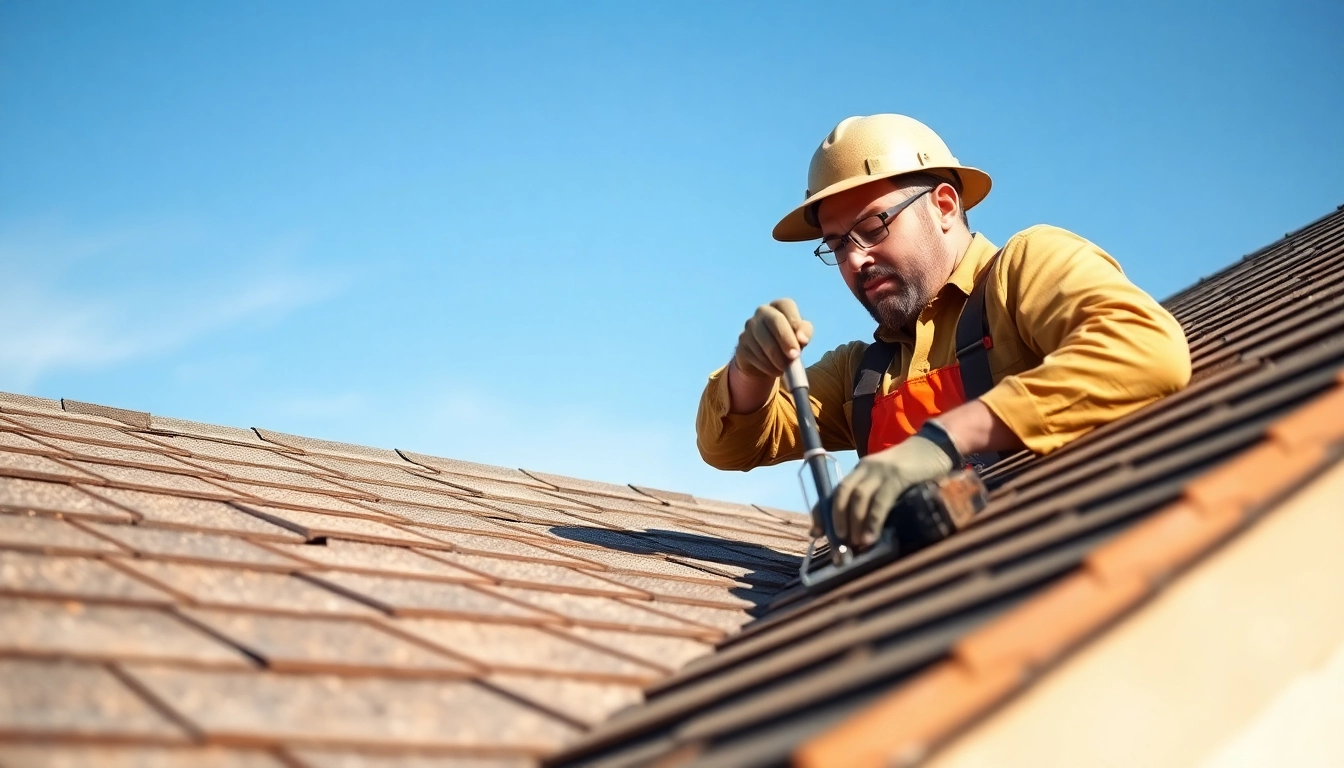Understanding Roofing Needs in Austin
When it comes to choosing the best roofing company in Austin, understanding your specific roofing needs is an essential first step. Austin’s dynamic climate presents unique challenges that homeowners must navigate, making it crucial to have a trusted partner who can address those requirements effectively. This article seeks to provide insights into the common roofing issues faced by residents in the Austin area, the importance of quality roofing solutions, and how local weather impacts roofs. By arming yourself with this knowledge, you will be equipped to make informed decisions when selecting a roofing contractor.
Common Roofing Issues Homeowners Face
The diverse weather conditions in Austin, ranging from intense summer heat to unpredictable storms, can lead to various roofing issues. Common problems include:
- Leakage: Heavy rains can cause leaks, damaging the interior of your home if not promptly addressed.
- Shingle Damage: High winds can lift or tear shingles, necessitating repairs or replacements.
- Blistering: Excessive heat can lead to blistering on roofs, particularly those made from asphalt.
- Moss Growth: Areas that retain moisture can develop moss, which may compromise the roof’s integrity.
- Structural Weakness: Over time, wear and tear can weaken the roof, making it susceptible to more severe damage.
Why Quality Matters in Roofing
Investing in quality roofing is not just about aesthetics; it plays a vital role in ensuring the safety and longevity of your home. Quality roofing materials and craftsmanship can:
- Enhance energy efficiency, reducing heating and cooling costs.
- Increase the home’s resale value, making it more appealing to potential buyers.
- Offer better durability and resistance against severe weather conditions.
- Optimize the lifespan of your roof, minimizing long-term repair costs.
Choosing a renowned roofing company that prioritizes quality can mitigate the risk of future complications and ensure a sound investment.
Evaluating Local Weather Impact on Roofs
Austin’s hot climate and sudden thunderstorms can put your roof’s integrity to the test. When evaluating roofing options, consider factors such as:
- Thermal Resistance: Ensure materials can withstand temperature extremes, which are common in this region.
- Water Resistance: Roofs should be able to handle heavy downpours and prevent water infiltration.
- Wind Resistance: With gusty winds, roofs must remain intact to avoid costly damages.
Because weather patterns can vary widely, it’s important to consult with local experts who understand the nuances of roofing in Austin.
Top Qualities of the Best Roofing Company in Austin
Finding the best roofing company in Austin requires careful evaluation of various factors that could affect the quality and reliability of service. Here are some key qualities to look for:
Experience and Expertise
An experienced roofing company brings a wealth of knowledge to every project. Look for contractors who have:
- A minimum number of years in the industry, showcasing their stability and reliability.
- Specialization in various roofing types, from residential to commercial solutions.
- A portfolio of completed projects that reflects their craftsmanship and attention to detail.
Contractors with rigorous training and certifications should also have a solid understanding of local building codes, ensuring compliance and durability.
Customer Reviews and Testimonials
Online reviews and testimonials are vital indicators of a company’s reputation. Consider:
- Checking platforms like Yelp or Google Reviews for feedback from past clients.
- Looking for consistent themes in reviews, such as mentions of timely service, professionalism, and quality of work.
- Identifying trends in complaints to understand potential issues with the contractor.
Don’t hesitate to reach out to past clients if testimonials are available—this can provide a first-hand account of what to expect.
Licensing and Insurance Requirements
Working with a licensed and insured roofing contractor is non-negotiable. This protects you and ensures that the company adheres to local regulations. When evaluating a contractor, ensure they have:
- Valid licensing that complies with Texas state laws.
- General liability insurance to cover any accidents or damages during the project.
- Workman’s compensation insurance to safeguard against on-site injuries.
Don’t hesitate to ask for documentation—legitimate contractors will provide this information without hesitation.
Comparing Roofing Services in Austin
Roofing services can greatly differ based on the specific needs of your project. In Austin, comparing different types of roofing services will provide clarity on what best suits your situation. Here’s how:
Residential vs. Commercial Roofing Solutions
Residential and commercial roofing solutions can vary significantly in terms of materials, design, and installation processes:
- Residential Roofing: Typically consists of asphalt shingles, tiles, or metal roofing, focusing on aesthetics and curb appeal.
- Commercial Roofing: Often includes flat or low-slope designs with materials like TPO or EPDM, focusing on efficiency and longevity.
If your roofing needs are specific to either type, tailor your search accordingly. A company that specializes in one type may not have the expertise necessary for the other.
Material Options and Best Practices
The choice of roofing material significantly affects durability, energy efficiency, and maintenance requirements. Here are some common options available:
- Asphalt Shingles: Affordable and popular, suitable for various home styles.
- Metal Roofing: Highly durable, energy-efficient, and perfect for heat absorption.
- Tile Roofing: Offers a striking appearance with excellent resilience against harsh weather.
Consult with the roofing company to determine which material best fits your specific needs, budget, and architectural style.
Cost Analysis: What to Expect
The cost of roofing services can vary widely based on several factors:
- Complexity and size of the roof.
- Type of materials chosen.
- Scope of work required (repairs vs. full replacement).
It’s essential to get detailed quotes from multiple contractors and understand what is included to avoid unexpected costs.
How to Choose the Right Roofing Company
Selecting the right roofing company can seem overwhelming, but by asking the right questions and conducting thorough research, you can ensure a successful partnership. Here are some strategies to guide your decision-making:
Questions to Ask Your Roofer
When interviewing potential roofing contractors, consider asking:
- What types of roofing services do you specialize in?
- Can you provide references from previous clients?
- What warranties do you offer on materials and labor?
- How do you handle weather delays during construction?
The answers to these questions can help you gauge the contractor’s reliability and customer service approach.
Red Flags to Watch Out For
While selecting a roofing company, keep an eye out for warning signs that may indicate a lack of professionalism or reliability:
- Refusal to provide a written estimate or contract.
- High-pressure sales tactics or overly aggressive advertising.
- Lack of transparency regarding insurance and licensing.
Trust your instincts—if something feels off, it may be best to seek out other options.
The Importance of Written Estimates
A detailed written estimate is crucial for managing expectations and financial planning. Ensure it includes:
- Clear breakdown of costs associated with materials and labor.
- Estimated timelines for project completion.
- Specifics on warranties and guarantees.
Having a comprehensive estimate will provide a clear reference point throughout the project and protect your investment.
Maintaining Your Roof for Longevity
Once your roof is installed, maintenance is key to its longevity and performance. Implementing proactive care routines can prevent major repairs down the line. Here are steps to ensure your roof’s durability:
Regular Inspections and Maintenance Tips
Routine inspections, preferably at least twice a year, are essential. Here are tips to keep in mind:
- Check for debris buildup, especially in gutters and valleys where water pooling can occur.
- Inspect for missing or damaged shingles and replace them promptly to avoid leaks.
- Ensure flashing around chimneys and vents is intact and free of rust or damage.
Consider hiring a professional for a comprehensive evaluation; they may identify early signs of trouble that you might miss.
Identifying Early Signs of Damage
Being proactive in identifying damage can prevent small issues from escalating into costly repairs. Signs to look out for include:
- Stains or discoloration on ceilings or walls.
- Visible sagging in the roofline.
- Excessive granules in the gutters, indicating shingle wear.
Immediate action on these signs can save you time and money in the long run.
Why Professional Care is Crucial
While DIY maintenance can be effective, professional care is paramount for:
- Expertise in identifying underlying issues that may not be visible.
- Proper safety measures to prevent accidents during inspection or repairs.
- Access to quality materials and warranties that DIY solutions may lack.
Forming a relationship with a reputable roofing company can ensure your roof gets the ongoing attention it needs to perform at its best.



